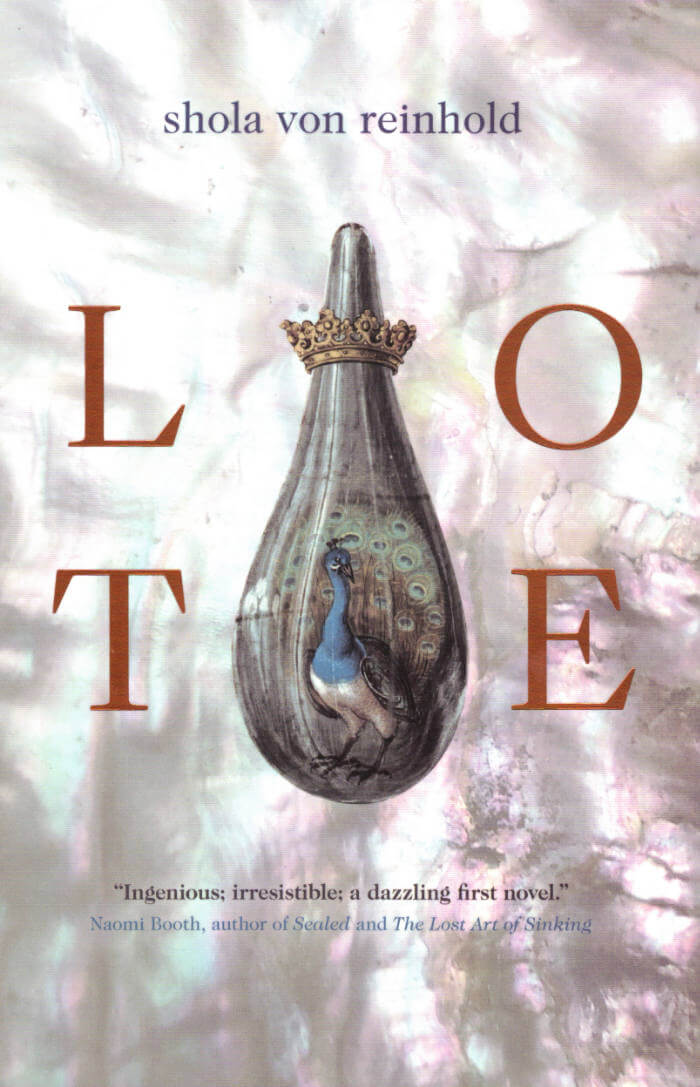Shola von Reinhold
Shola von Reinhold

Lote
Shola von Reinhold's decadent queer literary debut immerses readers in the pursuit of aesthetics and beauty, while interrogating the removal and obscuring of Black figures from history.
Solitary Mathilda has long harbored a conflicted enchantment bordering on rapture with the "Bright Young Things," the Bloomsbury Group, and their contemporaries of the '20s and '30s, and throughout her life her attempts at reinvention have mirrored their extravagance and artfulness. After discovering a photograph of the forgotten Black modernist poet Hermia Druitt, who ran in the same circles as the Bright Young Things, Mathilda becomes transfixed and resolves to learn as much as she can about the mysterious figure. Her search brings her to a peculiar artists' residency in Dun, a small European town in which Hermia was known to have lived during the '30s. The artists' residency throws her deeper into a lattice of secrets and secret societies that takes hold of her aesthetic imagination. From champagne theft and Black Modernisms to art sabotage, alchemy, and a lotus-eating proto-luxury communist cult, Mathilda's "Escapes" through modes of aesthetic expression lead her to question the convoluted ways truth is made and obscured.
Shola von Reinhold is a Scottish socialite and writer. Shola has been published in the Cambridge Literary Review, The Stockholm Review, was Cove Park's Scottish Emerging Writer 2018 and recently won a Dewar Award for Literature. Shola is a recent graduate from the Creative Writing MLitt at Glasgow which was completed through the Jessica Yorke Writing Scholarship and has previously studied Fine Art at Central Saint Martins. Shola has also written for publications including i-D, AnOther Magazine.
And more

Act Like You Know Me
The first comprehensive monograph and critical survey of American artist Pippa Garner, Act Like You Know Me surveys fifty years of her radical and transdisciplinary art practice, from the late 1960s to the early 2010s, through ca. 400 photographs, illustration, ephemera, and original writings.
Encompassing Garner's most iconic works, from the Backwards Car to the Half-Suit, alongside never-before-seen photographs and ephemera, Act Like You Know Me serves to introduce a highly-influential, under-recognized artist whose uncompromising approach to life and practice has allowed her to interact with the worlds of illustration, editorial, television, and art without ever becoming beholden to them.
Published on the occasion of Pippa Garner's travelling exhibition at Kunstverein Munich, Kunsthalle Zurich, Frac Lorraine (Metz) and White Columns (NYC).
Born in the suburbs of Chicago in 1942, Pippa Garner (formerly known as Philip Garner) has satirized American-style consumerism for decades, reifying the joys of everyday life and personal liberation along her way. With her prankish sense of humour and conceptual dedication to experimental engineering, she has altered materials of mass production—from Fordism through the pharmacopornographic era—subverting commercial binaries to reveal the transitory nature of material life and her own transpersonal identity.
Edited by Fiona Alison Duncan and Maurin Dietrich.
Texts by Pippa Garner, Shola von Reinhold, Dodie Bellamy, Fiona Alison Duncan.

Girls Like Us #14 - Letters of Disappointment
Marnie Slater, Katja Mater and 2 more
Considered an ‘ugly feeling’ by society’s norm, we’re not supposed to vocalize what and who is letting us down. We’re supposed to stay positive, get organized and act, instead of lingering in negative emotions. We’re supposed to be productive. But making space for disappointment can be a strategy of dissensus. Instead of wallowing in impotence, to make explicit what is not meeting expectations for this world can be an act of renouncing and making cracks in the status quo, while not giving up allegiance that another world is possible.
In Living a Feminist Life, Sara Ahmed writes: ‘we might think of how becoming feminist put us in touch with all that sadness, all those emotions that represent a collective failure to be accommodated to a system as the condition of possibility for living another way.’
In this issue we hope to plant the seeds of this rebellion by collecting a larger body of letters of disappointment. No matter how vague, impersonal, unimportant, futile, banal, or contingent these memories may seem; when shared and brought into a wider collective context, political desire may slip out from between the lines and build a corpus of transfeminist inheritance.
While spending some time with a tarot deck in preparation for this issue we obviously pulled the card of disappointment. In this deck, the illustration shows a beautiful drought: five crystal cups, which in the other cards overflow with fresh water, are shown here empty and dry.
‘The Five of Cups stands for an emotional crisis. It might be that unconscious fears come true, it could tell that feelings are disrupted or wasting away, the soul is empty and unfulfilled. In the sequence of the cups, the Five is the logical consequence of the Four. The grey tristesse that was lurking behind the luxury’s glamour is now exposed, the ‘truth is out’. The Five of Cups implies the loss of illusion, the realization of a deception. It hurts, but is necessary when we don’t want to spend the rest of our lives with our heads in the sand.’
We leave it up to you to imagine the possibilities or boundaries of what spending time with disappointment can make happen, for you, in your community, in the world.
Contributors: Pelumi Adejumo, Clara Balaguer, Dagmar Bosma, Staci Bu Shea, Alba Clevenger, Athena Farrokhzad, Sharona Franklin, Maike Hemmers, Calla Henkel, Sara Kaaman, Alena Kolesnikova, Maoyi (Peixuan Qiu), Katja Mater, Yelena Moskovich, Djuwa Mroivili, Sands Murray-Wassink, Raoni Muzho, Iarlaith Ni Fheorais, Ashley Nkechi Igwe, Milica Trakilović, Shola von Reinhold, Selma Selmani, Terre Thaemlitz, Yin Yin Wong, Anna Zvyagintseva, Sophie Zwertbroek, Joanna Walsh, Rosa Luxemburg, Yoyes Maria Dolores Gonzalez Katarain, Clara Zetkin, Alexandra Kollontai and Audre Lorde